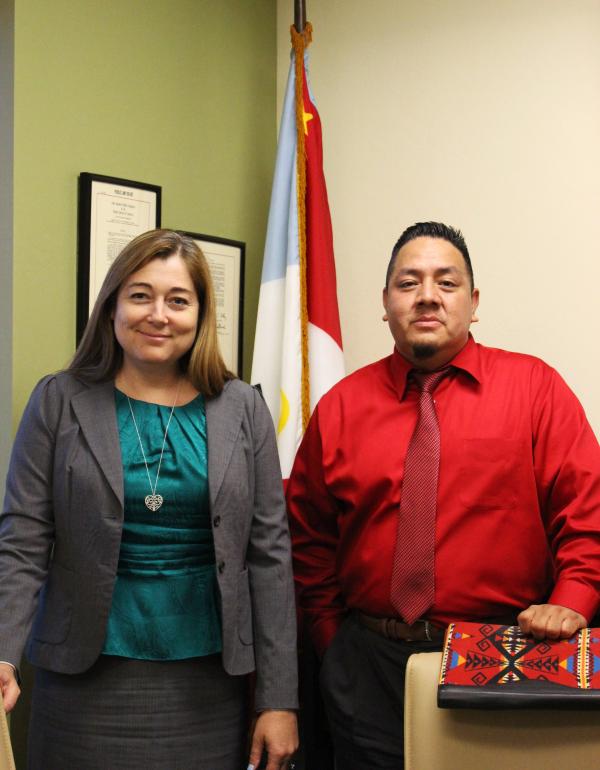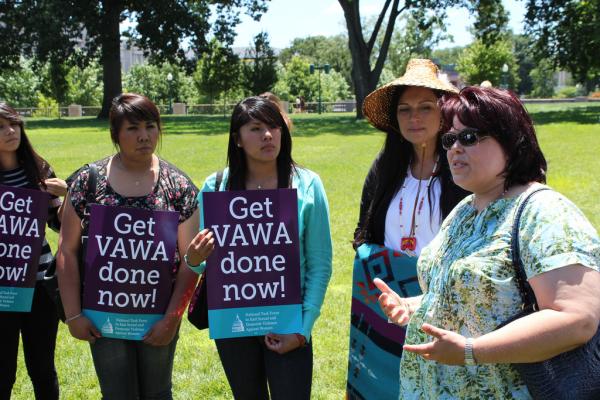The Pascua Yaqui Tribe is making progress in Southern Arizona after being chosen to take early advantage of the Violence Against Women Act (VAWA). “So far VAWA is helping us analyze our own process and the Pascua Yaqui Tribal Council is really interested in how this is going to work out,” said Amanda Lomayesva, Attorney General for the Pascua Yaqui Tribe.
On February 6, the Pascua Yaqui Tribe, the Tulalip Tribes of Washington and the Umatilla Tribes of Oregon were chosen by the Obama Administration to exercise criminal jurisdiction over certain crimes of domestic and dating violence, regardless of the defendant’s Indian or non-Indian status, under the 2013 VAWA law.
Lomayesva (Lumbee) said the Pascua Yaqui Tribe became interested in VAWA when they wanted to expand their tribal jurisdiction. “I think it really started to gain steam in 2007 when people started talking about problems in Indian Country –about crimes that were reoccurring and not being taken care of,” said Chief Prosecutor for the Pascua Yaqui Tribe, Alfred Urbina.
Not to mention, the Domestic Violence is the main crime on the Pascua Yaqui reservation, he said.
Prior to the assertion of VAWA, when a non-Native American committed a crime on the Pascua Yaqui reservation, the Pascua Yaqui Police officers would drop them off on the edge of the reservation, Lomayesva said.
Also, prior to 2010, tribal members accused of a crime would only be incarcerated for one year and the Pascua Yaqui jail was not fit for anyone. The office was in a house and the jail was a cage, said Urbina (Pascua Yaqui).
In 2010, the Tribal Law and Orders Act changed that allowing the tribe to sentence criminals up to three years of incarceration per offense with a maximum of nine years.
RELATED: Three Tribes to Begin Prosecuting Non-Indian Domestic Violence Offenders
And the tribe was able to have a multi-purpose justice complex built through a $20 Million American Reinvestment Recovery Act in 2010. “There has been a real tribal effort to address these problems and a challenge to not only our courts, but all tribal courts to protect tribal members,” said Lomayesva.
The tribe currently has 12 VAWA investigations that have lead to arrests of non-Native Americans, said Urbina. “We had two individuals that were wanted felons by the State of Arizona hiding out on the reservation,” he said. “This happens on our reservation a lot, and other surrounding reservations.”
RELATED: Justice Long Denied Comes to Indian Country; First Post-VAWA Trial Set
Also, they are finding that majority of the women involved in the cases are single, young females with children. Typically, both parties are unemployed, alcohol is involved and the accused are repeat offenders.
Urbina admits it is too early to start drawing conclusions. But he’s beginning to see what some of the key issues are, and is asking questions. “VAWA is giving us an opportunity to do an assessment and look into bigger problems,” he said.
Lomayesva admits that a couple of the VAWA cases have fallen apart, and it has led them to question what the tribe can do to help support domestic violence victims.
Tribal members Lourdes Escalante and Feliciano Cruz Sr. both believe VAWA will have a positive effect on their community. “As a community member I think it is about time the tribe start prosecuting non-Natives,” Cruz said. “If they live on our reservation they should abide by our laws.”
Cruz believes that domestic violence on the Pascua Yaqui reservation has gone on long enough and is happy to see that non-Native Americans who are accused won’t be “slapped on the back of the hands anymore. They commit the crime, they go to do the time.”
As for Escalante, a law student at the University of Arizona, is interested to see what VAWA does for her tribe. “I like that my tribe was one of the first to take this on,” she said. “Hopefully, it makes a huge difference; but since it is still kind of new, we will have to wait and see.”
Read more at http://indiancountrytodaymedianetwork.com/2014/06/09/vawa-already-improving-life-pascua-yaqui-tribe-155209?page=0%2C1



